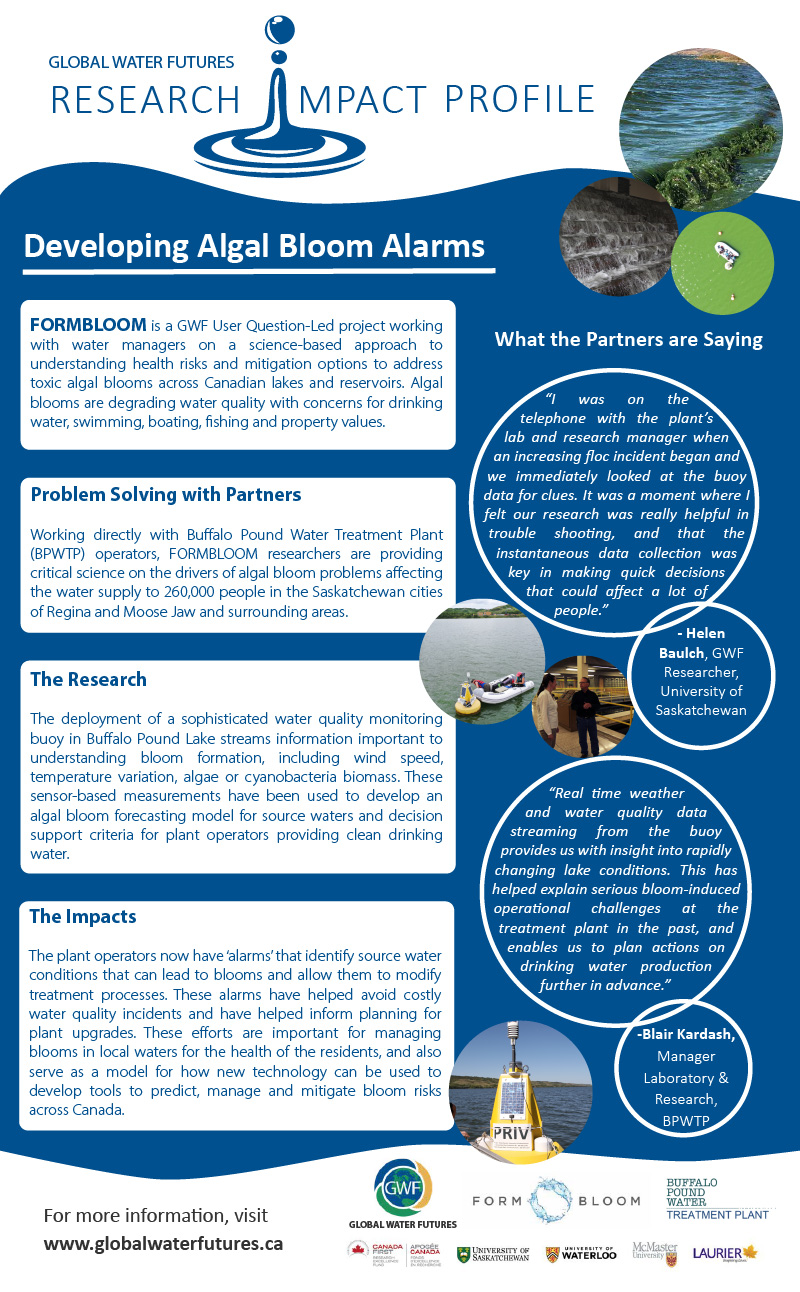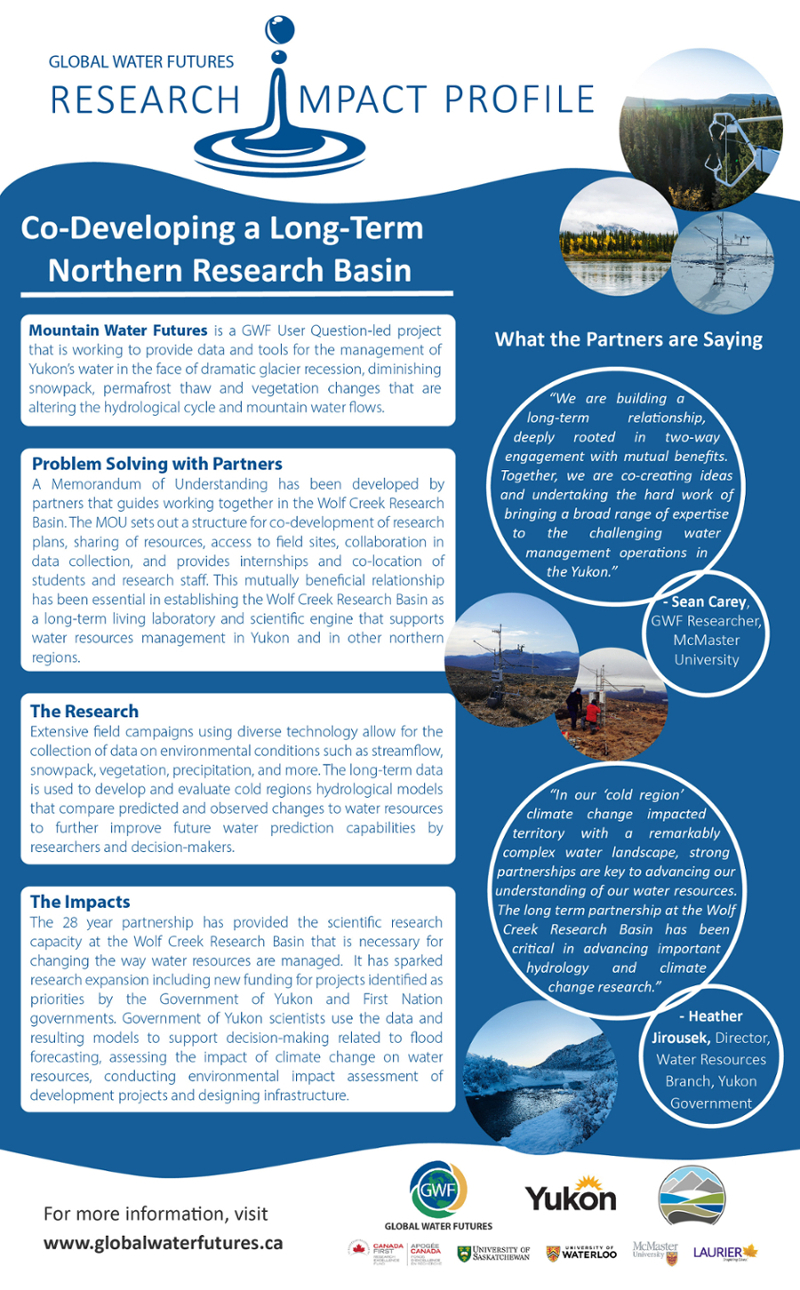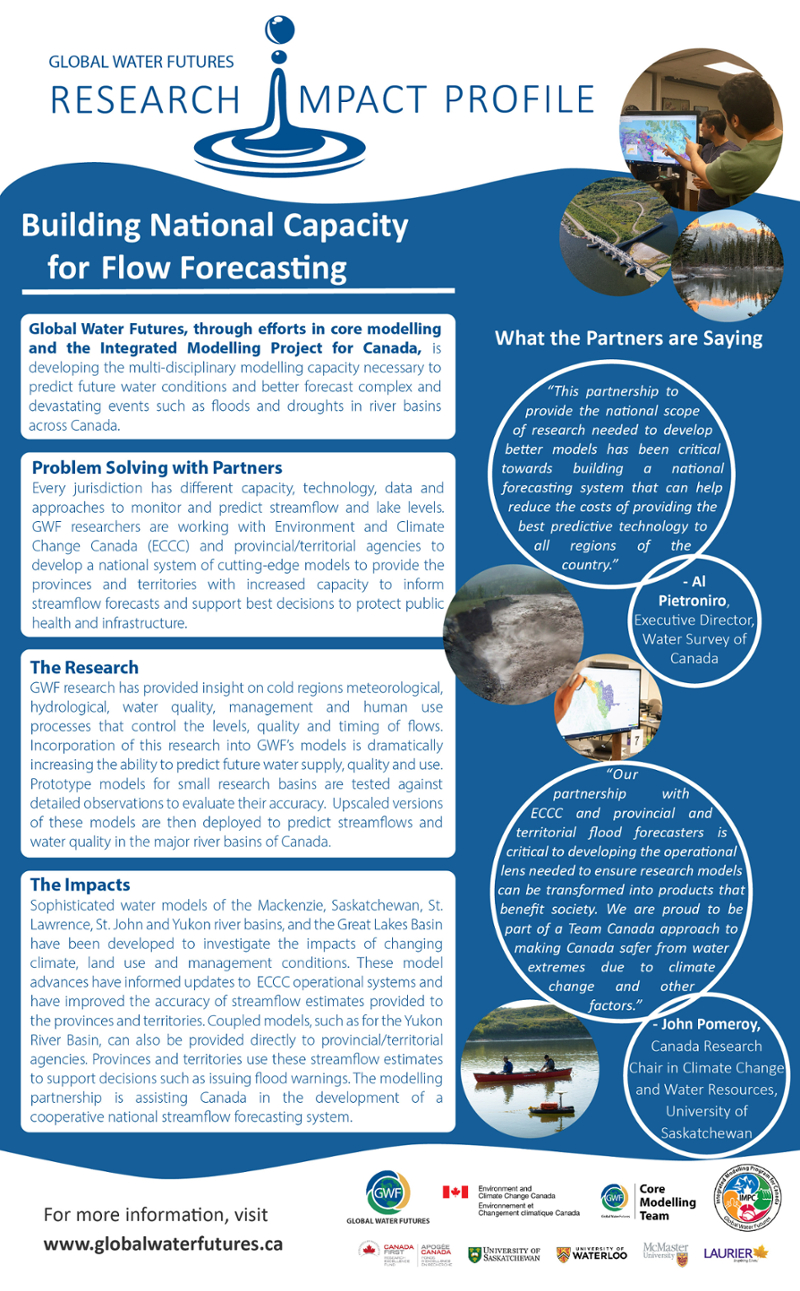Global Water Futures is committed to undertaking research with impact. Partners' needs are our beacon and shape our science that is predicting water futures, improving disaster warning and helping to adapt to and manage the increasing risks from climate change.
Visit regularly to view upcoming research impact profiles.
Global Water Futures Research Impact Profile
Developing Algal Bloom Alarms
FORMBLOOM is a GWF User Question-Led project working with water managers on a science-based approach to understanding health risks and mitigation options to address toxic algal blooms across Canadian lakes and reservoirs. Algal blooms are degrading water quality with concerns for drinking water, swimming, boating, fishing and property values.
Problem Solving with Partners
Working directly with Buffalo Pound Water Treatment Plant (BPWTP) operators, FORMBLOOM researchers are providing critical science on the drivers of algal bloom problems affecting the water supply to 260,000 people in the Saskatchewan cities of Regina and Moose Jaw and surrounding areas.
The Research
The deployment of a sophisticated water quality monitoring buoy in Buffalo Pound Lake streams information important to understanding bloom formation, including wind speed, temperature variation, algae or cyanobacteria biomass. These sensor-based measurements have been used to develop an algal bloom forecasting model for source waters and decision support criteria for plant operators providing clean drinking water.
The Impacts
The plant operators now have 'alarms' that identify source water conditions that can lead to blooms and allow them to modify treatment processes. These alarms have helped avoid costly water quality incidents and have helped inform planning for plant upgrades. These efforts are important for managing blooms in local waters for the health of the residents, and also serve as a model for how new technology can be used to develop tools to predict, manage and mitigate bloom risks across Canada.
What the Partners are Saying
"I was on the telephone with the plant's lab and research manager when an increasing floc incident began and we immediately looked at the buoy data for clues. It was a moment where I felt our research was really helpful in trouble shooting, and that the instantaneous data collection was key in making quick decisions that could affect a lot of people."
- Helen Baulch, GWF Researcher, University of Saskatchewan
"Real time weather and water quality data streaming from the buoy provides us with insight into rapidly changing lake conditions. This has helped explain serious bloom-induced operational challenges at the treatment plant in the past, and enables us to plan actions on drinking water production further in advance."
-Blair Kardash, Manager Laboratory & Research, BPWTP
For more information, visit: www.globalwaterfutures.ca
Logos: Global Water Futures, FORMBLOOM, Buffalo Pound Water Treatment Plant, Canada First Research Excellence, University of Saskatchewan, University of Waterloo, McMaster University, Wilfrid Laurier University

Global Water Futures Research Impact Profile
Co-Developing a Long-Term Northern Research Basin
Mountain Water Futures is a GWF User Question-led project that is working to provide data and tools for the management of Yukon's water in the face of dramatic glacier recession, diminishing snowpack, permafrost thaw and vegetation changes that are altering the hydrological cycle and mountain water flows.
Problem Solving with Partners
A Memorandum of Understanding has been developed by partners that guides working together in the Wolf Creek Research Basin. The MOU sets out a structure for co-development of research plans, sharing of assets, access to field sites, collaboration in data collection, and provides internships and co-location of students and research staff. This mutually beneficial relationship has been essential in establishing the Wolf Creek Research Basin as a long-term living laboratory and scientific engine that supports water resources management in Yukon and in other northern regions.
The Research
Extensive field campaigns using diverse technology allow for the collection of data on environmental conditions such as streamflow, snowpack, vegetation, precipitation, and more. The long-term data is used to develop and evaluate cold regions hydrological models that compare predicted and observed changes to water resources to further improve future water prediction capabilities by researchers and decision-makers.
The Impacts
The 28 year partnership has provided the scientific research capacity at the Wolf Creek Research Basin that is necessary for changing the way water resources are managed. It has sparked research expansion including new funding for projects identified as priorities by the Government of Yukon and First Nation governments. Government of Yukon scientists use the data and resulting models to support decision-making related to flood forecasting, assessing the impact of climate change on water resources, conducting environmental impact assessment of development projects and designing infrastructure.
What the Partners are Saying
"We are building a long-term relationship, deeply rooted in two-way engagement with mutual benefits. Together, we are co-creating ideas and undertaking the hard work of bringing a broad range of expertise to the challenging water management operations in the Yukon."
- Sean Carey, GWF Researcher, McMaster University
"In our 'cold region' climate change impacted territory with a remarkably complex water landscape, strong partnerships are key to advancing our understanding of our water resources. The long term partnership at the Wolf Creek Research Basin has been critical in advancing important hydrology and climate change research."
- Heather Jirousek, Director, Water Resources Branch, Yukon Government
For more information, visit: www.globalwaterfutures.ca
Logos: Global Water Futures, Yukon, Mountain Water Futures, Canada First Research Excellence, University of Saskatchewan, University of Waterloo, McMaster University, Wilfrid Laurier University

Global Water Futures Research Impact Profile
Building National Capacity for Flow Forecasting
Global Water Futures, through efforts in core modelling and the Integrated Modelling Project for Canada, is developing the multi-disciplinary modelling capacity necessary to predict future water conditions and better forecast complex and devastating events such as floods and droughts in river basins across Canada.
Problem Solving with Partners
Every jurisdiction has different capacity, technology, data and approaches to monitor and predict streamflow and lake levels. GWF researchers are working with Environment and Climate Change Canada (ECCC) and provincial/territorial agencies to develop a national system of cutting-edge models to provide the provinces and territories with increased capacity to inform streamflow forecasts and support best decisions to protect public health and infrastructure.
The Research
GWF research has provided insight on cold regions meteorological, hydrological, water quality, management and human use processes that control the levels, quality and timing of flows. Incorporation of this research into GWF's models is dramatically increasing the ability to predict future water supply, quality and use. Prototype models for small research basins are tested against detailed observations to evaluate their accuracy. Upscaled versions of these models are then deployed to predict streamflows and water quality in the major river basins of Canada.
The Impacts
Sophisticated water models of the Mackenzie, Saskatchewan, St. Lawrence, St. John and Yukon river basins, and the Great Lakes Basin have been developed to investigate the impacts of changing climate, land use and management conditions. These model advances have informed updates to ECCC operational systems and have improved the accuracy of streamflow estimates provided to the provinces and territories. Coupled models, such as for the Yukon River Basin, can also be provided directly to provincial/territorial agencies. Provinces and territories use these streamflow estimates to support decisions such as issuing flood warnings. The modelling partnership is assisting Canada in the development of a cooperative national streamflow forecasting system.
What the Partners are Saying
"This partnership to provide the national scope of research needed to develop better models has been critical towards building a national forecasting system that can help reduce the costs of providing the best predictive technology to all regions of the country."
- Al Pietroniro, Executive Director, Water Survey of Canada
"Our partnership with ECCC and provincial and territorial flood forecasters is critical to developing the operational lens needed to ensure research models can be transformed into products that benefit society. We are proud to be part of a Team Canada approach to making Canada safer from water extremes due to climate change and other factors."
- John Pomeroy, Canada Research Chair in Climate Change and Water Resources, University of Saskatchewan
For more information, visit: www.globalwaterfutures.ca
Logos: Global Water Futures, Environment and Climate Change Canada, Global Water Futures Core Modelling Team, Integrated Modelling Program for Canada, Canada First Research Excellence Fund, University of Saskatchewan, University of Waterloo, McMaster University, Wilfrid Laurier University

